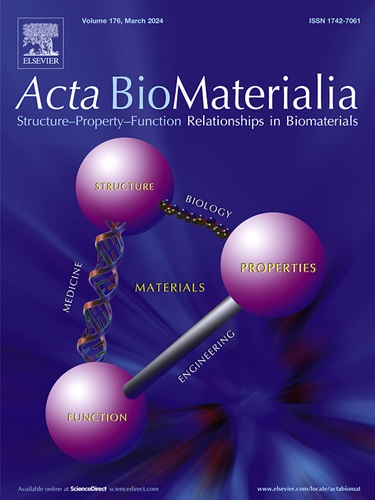Drug-loaded microneedle patches containing regulatory T cell-derived exosomes for psoriasis treatment
IF 9.4
1区 医学
Q1 ENGINEERING, BIOMEDICAL
引用次数: 0
Abstract
Psoriasis is a chronic inflammatory skin disease characterized by epidermal hyperplasia, skin inflammation, and immune dysregulation. These factors contribute to the persistent progression of the disease. While addressing excessive keratinocyte proliferation or inhibiting inflammation may provide temporary therapeutic relief, unresolved immune dysregulation often exacerbates the condition. Therefore, comprehensive treatments that alleviate skin symptoms and regulate immune tolerance are urgently required. An ideal treatment would target multiple factors, including keratinocyte proliferation, inflammation, and immune tolerance, while minimizing systemic side effects. In this study, we developed a dissolvable hyaluronic acid microneedle patch containing regulatory T cell (Treg) exosomes loaded with dimethyl fumarate (DMF) (rExo@DMF MNs). DMF acts as an inhibitor of keratinocyte proliferation and an anti-inflammatory agent through NF-κB suppression and Nrf2 activation, inhibiting the production of pro-inflammatory cytokines and the activation of inflammatory cells. Delivering DMF via Treg exosomes enhances its retention at the lesion site. This system inhibits keratinocyte proliferation and migration, reduces pro-inflammatory cytokine release, and alleviates epidermal hyperplasia and inflammation in an imiquimod-induced psoriasis mouse model. Additionally, Treg exosomes modulate immune responses to promote tolerance. rExo@DMF MNs demonstrate immunomodulatory effects by inhibiting T helper 17 (Th17) cells and inducing regulatory immune cells such as Tregs and tolerogenic dendritic cells (tDCs) differentiation. rExo@DMF MNs alleviate skin symptoms and regulate immune cells in the skin, spleen, and lymph nodes, demonstrating both local and systemic immunoregulation with promising therapeutic potential for psoriasis.
Statement of significance
Novel therapies are urgently needed to alleviate skin symptoms and regulate immunity, as current psoriasis treatments focus on symptom relief while neglecting the underlying immune dysfunction, resulting in limited efficacy. Moreover, systemic immunosuppression often leads to severe side effects. This study introduces a hybrid microneedle system (rExo@DMF MNs) that alleviates psoriasis symptoms and modulates immune responses locally and systemically. In addition, rExo@DMF MNs penetrate hyperkeratotic skin, ensuring targeted rExo@DMF release while minimizing systemic exposure and side effects. All components of the system, including hyaluronic acid (a key component of the skin matrix), regulatory T cell-derived exosomes, and DMF (a clinically validated drug), exhibit biocompatibility. This comprehensive approach addresses multiple pathogenic factors, promising an effective and safe psoriasis treatment.

含调节性T细胞衍生外泌体的载药微针贴片治疗银屑病
银屑病是一种慢性炎症性皮肤病,以表皮增生、皮肤炎症和免疫失调为特征。这些因素导致疾病的持续发展。虽然解决过度角质细胞增殖或抑制炎症可能提供暂时的治疗缓解,但未解决的免疫失调往往会加剧病情。因此,迫切需要缓解皮肤症状和调节免疫耐受的综合治疗。理想的治疗方法应该针对多种因素,包括角质细胞增殖、炎症和免疫耐受,同时尽量减少全身副作用。在这项研究中,我们开发了一种可溶解的透明质酸微针贴片,其中含有负载富马酸二甲酯(DMF)的调节性T细胞(Treg)外泌体(rExo@DMF MNs)。DMF通过抑制NF-κB和激活Nrf2,抑制促炎细胞因子的产生和炎症细胞的活化,起到角化细胞增殖抑制剂和抗炎剂的作用。通过Treg外泌体递送DMF可增强其在病变部位的保留。在吡喹莫特诱导的银屑病小鼠模型中,该系统抑制角化细胞增殖和迁移,减少促炎细胞因子释放,减轻表皮增生和炎症。此外,Treg外泌体调节免疫反应以促进耐受性。rExo@DMF MNs通过抑制T辅助性17 (Th17)细胞和诱导调节性免疫细胞如Tregs和耐受性树突状细胞(tDCs)分化来显示免疫调节作用。rExo@DMF MNs可缓解皮肤症状,调节皮肤、脾脏和淋巴结中的免疫细胞,显示局部和全身免疫调节,对牛皮癣具有良好的治疗潜力。目前银屑病的治疗注重缓解症状,忽视了潜在的免疫功能障碍,导致疗效有限,迫切需要新的治疗方法来缓解皮肤症状和调节免疫。此外,全身免疫抑制往往会导致严重的副作用。本研究介绍了一种混合微针系统(rExo@DMF MNs),可缓解银屑病症状并调节局部和全身免疫反应。此外,rExo@DMF MNs穿透角化过度的皮肤,确保有针对性的rExo@DMF释放,同时最大限度地减少全身暴露和副作用。该系统的所有成分,包括透明质酸(皮肤基质的关键成分)、调节性T细胞衍生的外泌体和DMF(一种临床验证的药物),都表现出生物相容性。这种综合的方法解决了多种致病因素,有望有效和安全的治疗牛皮癣。
本文章由计算机程序翻译,如有差异,请以英文原文为准。
求助全文
约1分钟内获得全文
求助全文
来源期刊

Acta Biomaterialia
工程技术-材料科学:生物材料
CiteScore
16.80
自引率
3.10%
发文量
776
审稿时长
30 days
期刊介绍:
Acta Biomaterialia is a monthly peer-reviewed scientific journal published by Elsevier. The journal was established in January 2005. The editor-in-chief is W.R. Wagner (University of Pittsburgh). The journal covers research in biomaterials science, including the interrelationship of biomaterial structure and function from macroscale to nanoscale. Topical coverage includes biomedical and biocompatible materials.
 求助内容:
求助内容: 应助结果提醒方式:
应助结果提醒方式:


